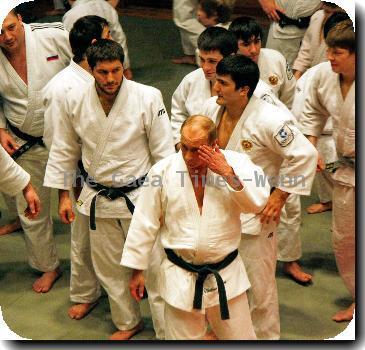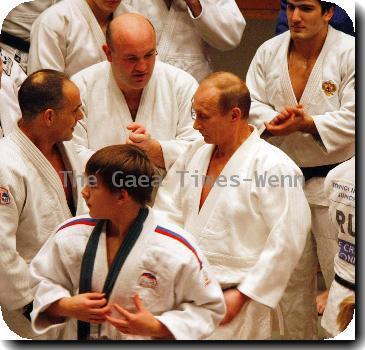New Russian Olympic committee chief says Russia must win most medals at Sochi 2014
By Gary Peach, APThursday, May 20, 2010
Deputy PM to head Russia’s Olympic committee
MOSCOW — Russia must rebound from its disastrous performance at the Vancouver Olympics by topping the medals table at the 2014 Winter Games on home soil in Sochi, the new head of Russia’s national Olympic committee said.
Deputy Prime Minister Alexander Zhukov was elected president of the Olympic committee Thursday as part of a shakeup following the debacle in Vancouver, where Russia won only three gold medals and 15 medals overall — its worst ever result.
Zhukov said Russia must first compete successfully at the 2012 Summer Games in London by at least matching its performance from the 2008 Beijing Olympics.
After that, he said, Russia “must win the overall team rankings in Sochi in 2014.”
“We all understand that our success in hosting the Olympics and Paralympic Winter Games will be directly dependent on the successful performance of Russian athletes,” Zhukov said.
“Our goals are ambitious, but achievable,” he added.
After the Vancouver Games, President Dmitry Medvedev and many lawmakers called for the resignation of the country’s top sports officials. Zhukov’s predecessor, Leonid Tyagachev, resigned in March.
Zhukov, a seasoned official with vast experience in finance and budget policy, was the only candidate on the secret ballot and received 204 of the 213 votes cast by Olympic committee members. There were five votes against and four invalid ballots.
As deputy premier, Zhukov has overseen construction and preparations for the 2014 Games in the Black Sea resort of Sochi.
As deputy to Prime Minister Vladimir Putin, Zhukov is expected to wield his influence to better coordinate efforts between Russia’s disparate sports authorities, which include a ministry, several Olympic-related organizations and dozens of sports federations.
“Preparations for the London Games in 2012 are no less important than for those in Sochi in 2014,” Zhukov told reporters after the vote. “Of course, there’s little time left, but we have to try.”
After taking office, Zhukov met with Medvedev and pledged to use the committee’s power to crack down on doping, which has tainted the image of Russian sports.
“We must eradicate with scorching steel the psychology of some athletes and coaches based on the assumption that it’s impossible to win Olympic medals or reach other high achievements without doping,” Zhukov said in televised comments.
Speaking in a separate video feed to reporters in London, Zhukov said Russia adopted a special anti-doping law in the past few days and was developing further programs to combat the use of banned drugs.
Several Russian biathletes and cross-country skiers were banned for doping offenses in the months before the Vancouver Games, and IOC president Jacques Rogge said the country needed to get tougher on cheaters.
While presenting his program for reviving Russia’s Olympic hopes, Zhukov stressed that sports officials needed to pay more attention to athletes.
“Athletes are a national treasure — we need to take care of them,” he said.
One of his proposals will be to open an Olympic health clinic where athletes could receive improved services and recover from serious injuries. Another is to provide athletes with training so they will have career opportunities once they retire from sports.
Zhukov, who headed the country’s chess federation between 2003 and 2009, also said he would try to convince the International Olympic Committee to include chess in the Olympic program.
On another matter, Zhukov said he is confident that Sochi’s luge and bobsled track will be safe following the death of a Georgian luger during a practice run hours before the start of the Vancouver Games.
“All of the Olympic venues, all the routes are very thoroughly inspected by representatives of international sports federations and representatives of the International Olympic Committee,” he said.
“I very much hope and am sure that Sochi’s collaboration with the top sports experts will enable us to avoid anything of the kind that happened in Vancouver.”
Associated Press Writer Keith Moore in London contributed to this report.
Tags: British Columbia, Canada, Chess, Cross Country Skiing, Doping, Eastern Europe, England, Europe, Events, Games, London, Luge, Moscow, North America, Political Resignations, Recreation And Leisure, Russia, Skiing, Sochi, United Kingdom, Vancouver, Vladimir Putin, Western Europe, Winter Olympic Games

